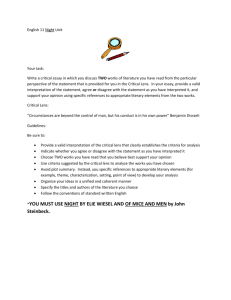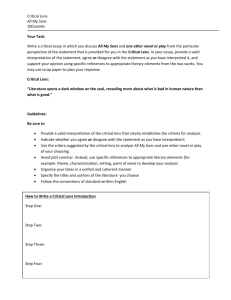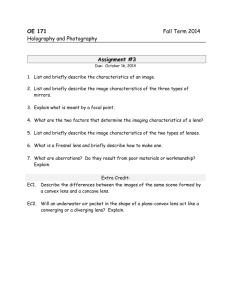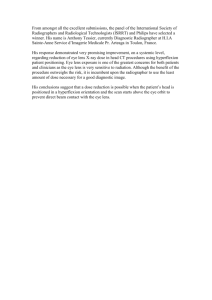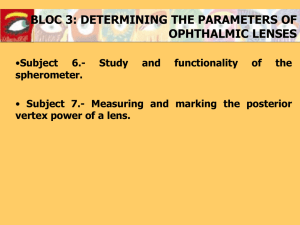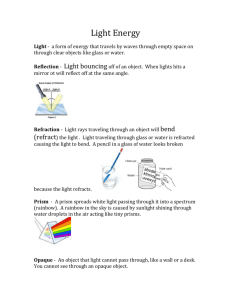July 26 2015, 9 Pentecost, Year B..(in Word DocX format)
advertisement
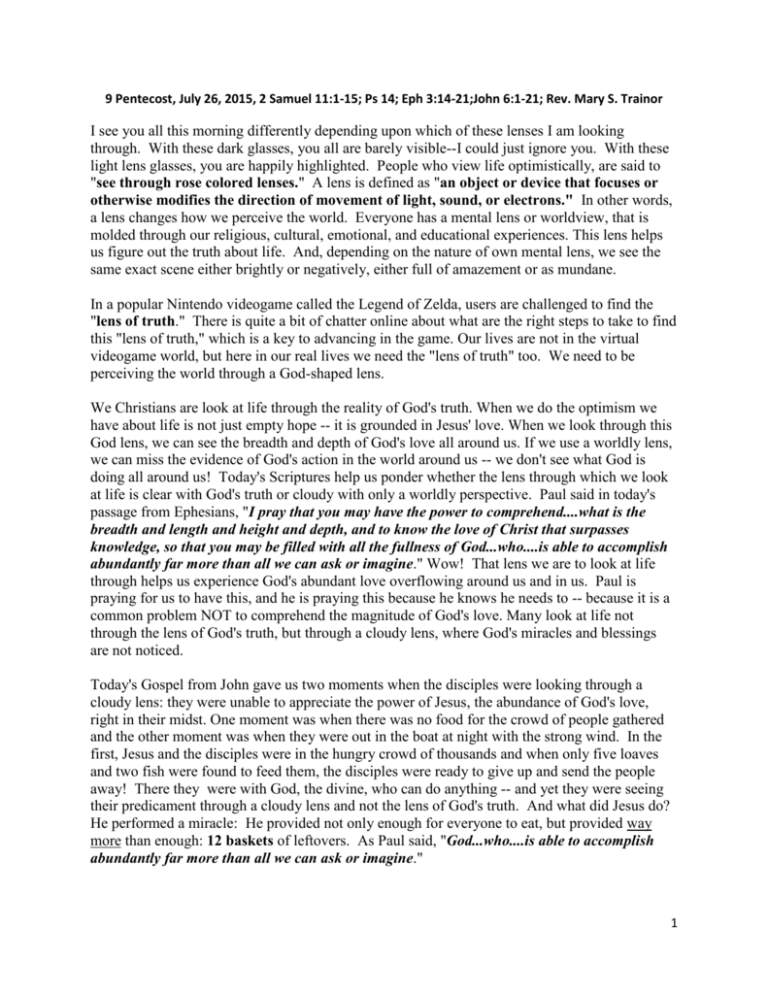
9 Pentecost, July 26, 2015, 2 Samuel 11:1-15; Ps 14; Eph 3:14-21;John 6:1-21; Rev. Mary S. Trainor I see you all this morning differently depending upon which of these lenses I am looking through. With these dark glasses, you all are barely visible--I could just ignore you. With these light lens glasses, you are happily highlighted. People who view life optimistically, are said to "see through rose colored lenses." A lens is defined as "an object or device that focuses or otherwise modifies the direction of movement of light, sound, or electrons." In other words, a lens changes how we perceive the world. Everyone has a mental lens or worldview, that is molded through our religious, cultural, emotional, and educational experiences. This lens helps us figure out the truth about life. And, depending on the nature of own mental lens, we see the same exact scene either brightly or negatively, either full of amazement or as mundane. In a popular Nintendo videogame called the Legend of Zelda, users are challenged to find the "lens of truth." There is quite a bit of chatter online about what are the right steps to take to find this "lens of truth," which is a key to advancing in the game. Our lives are not in the virtual videogame world, but here in our real lives we need the "lens of truth" too. We need to be perceiving the world through a God-shaped lens. We Christians are look at life through the reality of God's truth. When we do the optimism we have about life is not just empty hope -- it is grounded in Jesus' love. When we look through this God lens, we can see the breadth and depth of God's love all around us. If we use a worldly lens, we can miss the evidence of God's action in the world around us -- we don't see what God is doing all around us! Today's Scriptures help us ponder whether the lens through which we look at life is clear with God's truth or cloudy with only a worldly perspective. Paul said in today's passage from Ephesians, "I pray that you may have the power to comprehend....what is the breadth and length and height and depth, and to know the love of Christ that surpasses knowledge, so that you may be filled with all the fullness of God...who....is able to accomplish abundantly far more than all we can ask or imagine." Wow! That lens we are to look at life through helps us experience God's abundant love overflowing around us and in us. Paul is praying for us to have this, and he is praying this because he knows he needs to -- because it is a common problem NOT to comprehend the magnitude of God's love. Many look at life not through the lens of God's truth, but through a cloudy lens, where God's miracles and blessings are not noticed. Today's Gospel from John gave us two moments when the disciples were looking through a cloudy lens: they were unable to appreciate the power of Jesus, the abundance of God's love, right in their midst. One moment was when there was no food for the crowd of people gathered and the other moment was when they were out in the boat at night with the strong wind. In the first, Jesus and the disciples were in the hungry crowd of thousands and when only five loaves and two fish were found to feed them, the disciples were ready to give up and send the people away! There they were with God, the divine, who can do anything -- and yet they were seeing their predicament through a cloudy lens and not the lens of God's truth. And what did Jesus do? He performed a miracle: He provided not only enough for everyone to eat, but provided way more than enough: 12 baskets of leftovers. As Paul said, "God...who....is able to accomplish abundantly far more than all we can ask or imagine." 1 The second moment the disciples faced was out in the boat they were rowing at night, three or four miles out in the Sea of Galilee. They were scared, the wind was strong - their boat was small, and could have overturned in the waves. But they had been with Jesus, they knew He was around, they knew He had not and never would leave them. But "they were terrified" anyway. And what did Jesus do? He performed a miracle: He walked out to them on the sea, and rescued them. In these two instances, Jesus cleared up the disciples' cloudy lenses: they were able to now "comprehend....what is the breadth and length and height and depth, and to know the love of Christ that surpasses knowledge, so that you may be filled with all the fullness of God." Today, as yourself what lens you are looking through. Are you looking through a God lens of truth, that clearly shows you the glory of God's gifts? I have a friend who I go walking with sometimes. While walking I talk with amazement about the diversity of flowers: their shapes, colors, sizes, seeds, fruits, and about what an incredible gift God has given us with all this variety. God gave us the Iris, Daffodil, Lily, Orchid, Appleblossom, Forget-me-not, Rose, Lilac, Hyacinth, Marigold, and so on. God gave us flowers not only beauty to behold, but also as food! Wow! WAY MORE than I could ever expect or imagine! But my friend does not see it this way, and finds me silly for suggesting that God provided us all this diversity and beauty. My friend sees through a cloudy, earthly lens. I have another friend who recently has experienced an incredible physical cure that amazed the doctors, and had been prayed for a great deal. Yet that friend does not acknowledge God's healing power; she is looking through a cloudy lens. God wants her to to know the love of Christ that surpasses knowledge...(to) be filled with all the fullness of God." What is the lens like that you are looking at life through? Is it clouded over with earthly stuff such that you cannot see God's overflowing blessings? God wants you to be able to fully appreciate and experience "the breadth and length and height and depth, (of) the love of Christ." Jesus in our midst, "is able to accomplish abundantly far more than all we can ask or imagine." You can clear the cloudiness of the lens with an attitude of gratitude. Coming to God with a grateful heart is like a windshield washer and wiper for those cloudy lenses. Pray prayers of thanksgiving to God. Jesus "gave thanks" right before the loaves and fish were multiplied. Eucharist means "thanksgiving." Let us pray the Litany of Thanksgiving on page 837 of the BCP: Let us give thanks to God our Father for all his gifts so freely bestowed upon us. For the beauty and wonder of your creation, in earth and sky and sea. We thank you, Lord. For all that is gracious in the lives of men and women, revealing the image of Christ, We thank you, Lord. For our daily food and drink, our homes and families, and our friends, We thank you, Lord. For minds to think, and hearts to love, and hands to serve, We thank you, Lord. For health and strength to work, and leisure to rest and play, We thank you, Lord. For the brave and courageous, who are patient in suffering and faithful in adversity, We thank you, Lord. For all valiant seekers after truth, liberty, and justice, We thank you, Lord. For the communion of saints, in all times and places, We thank you, Lord. Above all, we give you thanks for the great mercies and promises given to us in Christ Jesus our Lord; To him be praise and glory, with you, O Father, and the Holy Spirit, now and for ever. Amen. 2
